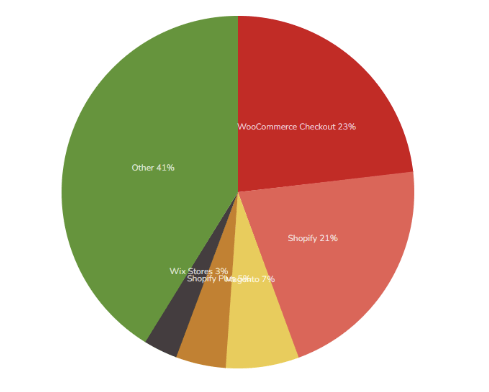We are often asked why we recommend WooCommerce instead of Shopify for our clients’ online stores. WooCommerce and Shopify are both prominent eCommerce platforms, each offering a different set of features. However, we feel that WooCommerce has several advantages over Shopify for our clients.
Current Market Share:
WooCommerce and Shopify are practically neck-and-neck in market share in 2023 with WooCommerce being used for 23% of the top 1 million websites compared to Shopify’s 21%.

[source BuiltWith, last updated 09 June 2023 https://trends.builtwith.com/shop ]
WooCommerce, which operates as part of a WordPress website, provides a level of control, flexibility, and customizability that is not matched by Shopify, offering you the ability to fully tailor your online store to match your specific business requirements. Moreover, the superior SEO and blogging capabilities of WordPress mean that you can effectively reach your target audience, creating a strong online presence. Although Shopify has its strengths and can be a perfect fit for certain businesses, those who want total control over their online stores and a platform that can adapt to their evolving needs will find WooCommerce the better option.
10 Reasons to Choose WooCommerce Over Shopify in 2023
Complete Ownership: With WooCommerce, you own your store entirely, including all the data related to it. This ownership aspect is crucial for businesses that value their independence and privacy. On the other hand, with Shopify, your data is stored on their servers, meaning you don’t have full control over it. I put this as #1 because we see it over and over again – clients who want to move their stores but are trapped with the Shopify system.
Pricing: WooCommerce is a free plugin. Yes, you’ll need to pay for hosting, security, and any premium plugins you choose to use, but the basic software doesn’t cost anything. Shopify, on the other hand, has a base monthly fee, plus additional costs for certain features and apps.
No Additional Transaction Fees: Shopify charges an additional transaction fee for every sale unless you’re using Shopify Payments. WooCommerce does not impose transaction fees. Although you’ll still have to pay the standard fees charged by your payment gateway, avoiding an additional cost can help save a considerable amount over time.
Better SEO Capabilities: WordPress, on which WooCommerce is built, is renowned for its robust SEO capabilities. With this combination, you’ll have access to a vast array of SEO plugins and tools, giving you the power to optimize your store for better search engine visibility. Although Shopify has basic SEO features, it can’t match the comprehensive SEO toolset that WooCommerce offers.
Blogging Capabilities: Shopify includes a basic blogging feature, but it’s quite limited when compared with WordPress’s blogging capabilities. If content marketing is part of your strategy (as it should be) then the superior blogging tools of WooCommerce can give your eCommerce store a significant boost.
Design Flexibility: With WooCommerce, you have more control over the design and appearance of your online store, allowing you to create a unique and personalized look that aligns with your brand. Shopify, on the other hand, has a more structured and standardized design approach, with a selection of pre-designed themes that can be customized to a certain extent but may have limitations when it comes to achieving a truly bespoke design.
Customizability and Flexibility: One of the most significant advantages of WooCommerce over Shopify is its unparalleled customizability. As open-source platforms, WooCommerce and WordPress give their users complete control over every aspect of their online store. This means you can modify your site to your heart’s content, introducing unique functionalities that align with your business needs. Shopify, while offering a range of customization options, still operates within a proprietary framework, limiting what users can modify.
Extensive Plugin Ecosystem: WooCommerce and WordPress have a large plugin ecosystem, encompassing everything from marketing tools to SEO, analytics, and payment gateways. The open-source nature of both means that developers from around the world are continuously creating and updating plugins. This ecosystem gives WooCommerce users an edge when it comes to integrating advanced functionality into their online stores.
Environmental Controls: As the platform self-hosts, users can manage every aspect of their online store, from the server performance to the security measures. This contrasts with Shopify, where you have to work within the provider’s set parameters. For businesses wanting to maintain tighter control over their operations, WooCommerce is an excellent choice.
Adaptability: WooCommerce is known for its adaptability. It can support businesses as they scale, from small start-ups to large enterprises. While Shopify is also scalable, it doesn’t offer the same level of flexibility and customization that growing businesses may require.
If you would like to know more, contact our eCommerce experts at V Digital Services.
Top In eCommerce Usage Distribution in the Top 1 Million Sites


 PREVIOUS
PREVIOUS